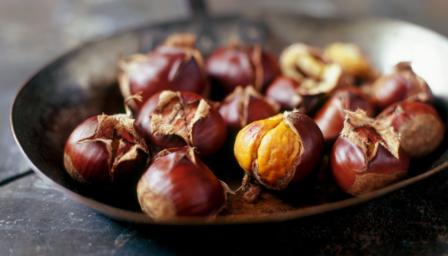Winter time is coming and with it all the joys of the season. I love love loveee the time of year before Christmas <3 I know, I know, it’s only November, but I just can’t help myself. I just love it and I’m not ashamed to admit it. When November begins that’s my que to start planning Christmas presents for family and friends and watching Christmas movies, of course! Watching Love Actually during the first weekend of November has become sort of a tradition of mine and it marks the begining of Christmas season for me :P just to be totally honest, I might watch Love Actually at least every two weeks untill Christmas…Actually, I probably will. Okay, okay…I know I will, cause I do every year :D

But this isn’t a post about Christmas or Love Actually. It is however a post about something delicious and hot and something that smells great and something that makes me feel wintery and christmasy and lovely…I’m babbling…
This is a post about CHESTNUTS :D Chestnuts roasting on an opeeen fireee…

Okay, so..Chestnuts. Love them. But how much do you really know about them?
- They are relatively low in calories - compared to other nuts - around 200 Kcal per 100g
- They are starchy in contrast to other seeds and nuts, their nutrition composition is similar to other staple starch foods such as sweet potato, sweet corn, potatoes,
- They are a good source of dietary fiber; provide 8.1 g (about 21% of RDI) per 100 g. Fiber diet helps lower blood cholesterol levels by limiting excess cholesterol absorption in the intestines.
- They are exceptionally rich in vitamin-C. 100 g nuts provide 43 mg of vitamin C (72 % of DRI).
- They are rich in folates, which is quite a rare but unique feature for nuts and seeds. 100 g nuts provide 62 µg of folates (or 15.5% DRI). Folic acid is required for the formation of red blood cells, DNA synthesis. Adequate consumption of food rich in folates is especially important before and during the first trimester of pregnancy as it helps prevent neural tube defects.
- Chestnuts contain high levels of essential fatty acids, including linoleic acid, which are beneficial to cardiovascular health and proper neurological development in infants,
- The nuts are an excellent source of minerals such as iron, calcium, magnesium, manganese, phosphorus and zinc, besides providing a very good amount of potassium
- Further, they are also rich in many important B-complex groups of vitamins. 100 g of nuts provide 11% of niacin, 29% of pyridoxine (vitamin B-6), 100% of thiamin, and 12% of riboflavin.

Plus, they are delicious and smell nice and when they start selling roasted chestnuts you know it’s the time of year to be jolly :D





No comments:
Post a Comment